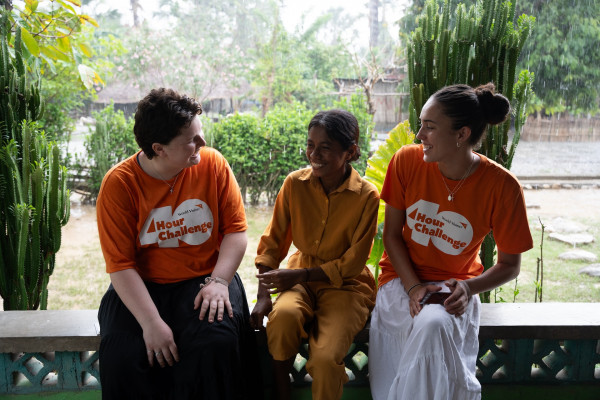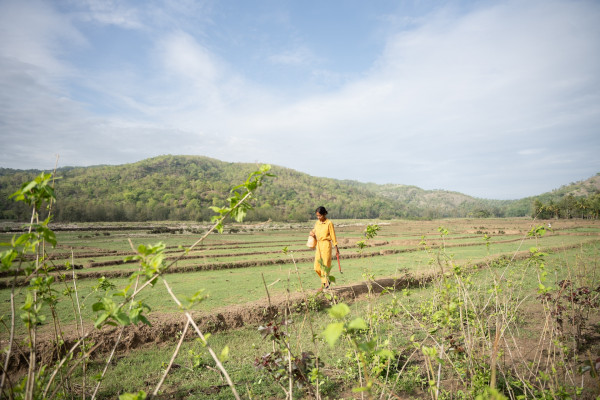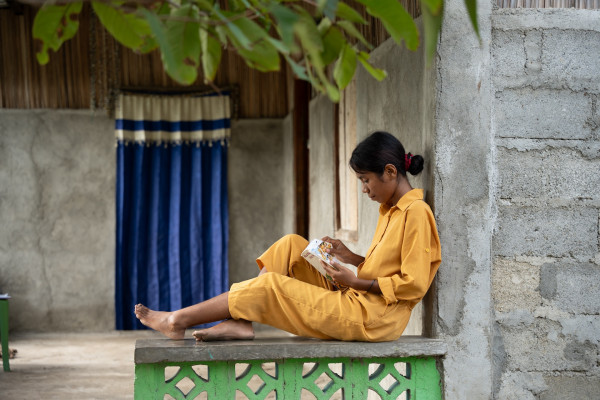World Vision youth ambassador Nora Quigley travelled to Timor Leste, one of the world’s most climate vulnerable countries, to learn about the work funded by the World Vision 40 Hour Challenge 2024. What she found was both familiar and heartbreaking.
Who knew that when I travelled 6,000 km from my home in Aotearoa to Timor-Leste I would make a new friend with so much in common – but with one major difference, the devastating impact of climate change.
Her name is Pasquela and she’s two years older than me. I’ve got an Irish/Kiwi accent whereas she speaks Tetum; I have short hair, hers is long; I study at University, but she is no longer able to.
We sound like polar opposites, but we’re actually not that different. We both grew up on a farm and we’re both the oldest children in our families. We get annoyed by our siblings, but we love them dearly. We both loved English at school and like to sing at church.

Nora, left, and Pasquela, centre, talking in Timor Leste. Photo: Supplied
We’ve both experienced the devastation of climate change. Pasquela’s family once worked a thriving rice farm which was destroyed by cyclone Seroja in 2021. Her whānau lost their entire crop and source of income in a matter of days.
In her once-fertile village, Pasquela shared with me the fear she felt as the heaviest rain fell outside. The streets outside their house flooded, something they now consider ‘normal’.
Now, three years on, the soil is dry, water runs off it, the irrigation system is broken. It’s a struggle for Pasquela’s parents to feed their children and they can’t afford to get their farm working again.
I know how she feels. In May 2021, my parents’ farm in mid Canterbury was flooded in a once-in-200 year flooding event.
As a result, much of our community was water-locked for days, with no way in or out. It was stressful, scary, and I didn’t know when I’d be able to get back to boarding school.
Civil Defence stepped in to help those in need and within a week we were able to recover.

Pasquela walking along the rows. Photo: Supplied
That’s not what happened for Pasquela
Her family had no emergency support, and they still have no water supply at their house. The floods also took away their food security.
After the cyclone her family relied on the generosity of their community to survive. Now, instead of growing their own rice her parents now have to spend NZD$17.00 every few weeks to purchase a 21 kg bag, a crucial lifeline for her family.
Cyclone Seroja shattered Pasquela’s dreams of completing her university studies. She's required to work to earn money for the family now. Her younger siblings had to leave school because her family can’t pay for their education.
As the rain fell relentlessly during our time in Timor-Leste and the water rose to the height of our knees, it reminded me that while much of our lives seemed similar, the opportunities all of us have are largely based on where we live.
Here in New Zealand, when an extreme weather event hits I might have to study from home because the buses can’t run.
But then a few days later it’s cleared and we have the resources to begin a clean-up and restoration process.
For communities like Pasquela’s, that doesn’t happen. There’s no clean up. There’s no rebuild. They just lose their food and their income. Pasquela is losing her dreams for her future.
When I returned to New Zealand, I realised my voice can be a powerful advocate for Pasquela and Timor Leste.

Cyclone Seroja shattered Pasquela’s dreams of completing her university studies. Photo: Supplied
I used to stay quiet when the conversation would turn to climate change because I didn't want to seem disruptive
But in reality climate change is disrupting people's lives to an enormous degree.
People are being cut off from basic human rights – shelter, clean drinking water, health care, education, and food.
It’s a humanitarian issue.
This year’s World Vision 40 Hour Challenge is centred on fighting the impacts of climate change, partnering with communities in Timor-Leste to help them to become more resilient.
One of the ways in which we do this is through Farmer Managed Natural Regeneration (FMNR), equipping local farmers to make their community more sustainable.
Communities learn to tap into long-forgotten underground forests and manage the regeneration of trees that were cut down many years ago.
They start with an underground root system and with careful work can re-grow these trees in just two years.
These trees then sequester carbon dioxide, stabilise the topsoil to mitigate landslides, and increase the soil richness.
We visited a village in Timor-Leste where this work is already happening.
I talked to one mother who told me about how learning how to plant superfoods means that now her babies are well fed, and that she’s no longer scared when the rain comes.
These projects also help to provide employment opportunities for women and improve mental and emotional health.
This gave me so much hope
Hope that Pasquela’s family will benefit from this programme.
Her story doesn’t just finish here. Right now, she should be in a lecture theatre one year away from graduating, instead she’s at home helping her community recover from an event they shouldn’t have faced in the first place.
It's time to take action so young people like Pasquela can have a brighter future.
One way we can do this is by joining this year’s World Vision 40 Hour Challenge.
It’s a powerful way to challenge yourself, to truly make a positive difference for people like Pasquela, and to do something groundbreaking and proactive to help fight the impacts of climate change.
You can sign up for the World Vision 40 Hour Challenge here: 40hour.org.nz
More stories
This chest binder changed my life
“It's one of the most important things for a lot of trans-masc individuals.”
A person with borderline personality disorder answers your questions
“People say ‘They're crazy, they can't have relationships’. That hurts me.”
Should tikanga Māori be taught in law schools?
"It's important law reflects the society it governs."